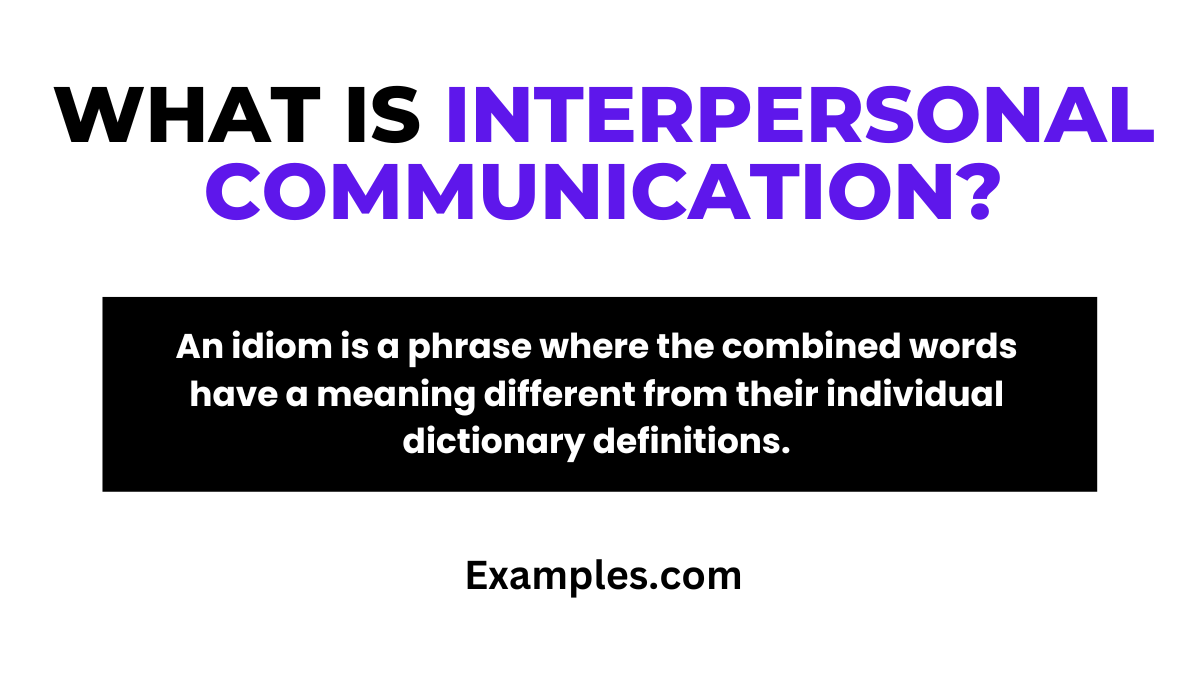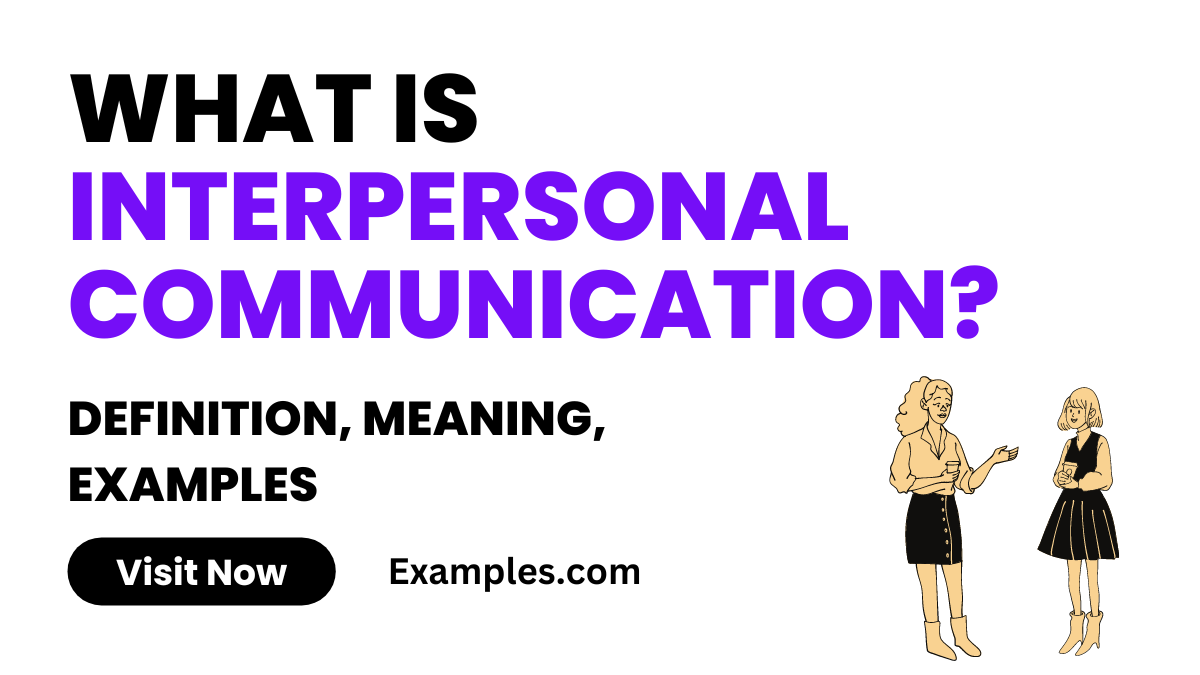What is Interpersonal Communication?
Interpersonal Communication is a vital aspect of our daily interactions, influencing both personal and professional relationships. This guide delves deep into its definition, exploring the nuances and significance of effective interpersonal exchanges. From verbal and non-verbal cues to active listening and empathy, we cover key elements that make communication truly interpersonal. Packed with real-life examples, this comprehensive guide equips you with essential tips and strategies to enhance your communication skills, ensuring you navigate various social situations with ease and confidence. Discover how mastering Interpersonal Communication can transform your connections and interactions at every level.
What is Interpersonal Communication? – Definition

Interpersonal communication is the process of exchanging messages, feelings, or information between two or more people. It involves not just talking, but also listening, understanding, and often non-verbal signals like facial expressions or body language. This type of communication can happen in person, over the phone, or through digital means like emails and social media. It’s a key part of our daily interactions with friends, family, colleagues, and even strangers, playing a crucial role in building relationships, sharing ideas, and understanding each other.
Interpersonal Communication Examples
- Casual Conversations: Chatting with a friend about weekend plans or discussing favorite movies.
- Workplace Meetings: Collaborating with colleagues on a project, sharing updates, and brainstorming ideas.
- Family Discussions: Talking with family members about household responsibilities or planning a family event.
- Conflict Resolution: Having a calm, respectful conversation to resolve a disagreement with a friend or partner.
- Giving and Receiving Feedback: Providing constructive feedback to a coworker or receiving advice from a mentor.
- Social Networking: Interacting with friends or acquaintances online through comments, messages, or posts.
- Emotional Support Conversations: Comforting a friend going through a tough time or sharing personal challenges.
- Negotiating Agreements: Discussing terms and conditions in a business deal or planning a group vacation with different opinions.
Importance of Interpersonal Communication
Interpersonal communication is Important for building and maintaining relationships. It enables understanding and collaboration, facilitates problem-solving, and is essential for emotional sharing. Effective interpersonal communication enhances personal and professional life, promoting empathy, trust, and stronger bonds between individuals.
Characteristics of Interpersonal Communication
Interpersonal communication is characterized by its directness, personal nature, and two-way interaction. It involves both verbal and non-verbal elements, is influenced by the context and relationships between the communicators, and requires active participation, including listening and feedback.
Types of Interpersonal Communication
There are various types of interpersonal communication, including verbal (spoken words), non-verbal (body language, facial expressions), written (texts, emails), and visual (signs, symbols). Each type plays a unique role in conveying messages and emotions, and often, they are used together for effective communication.
- Verbal Communication in Interpersonal Communication
- Non-Verbal Communication in Interpersonal Communication
- Written Communication in Interpersonal Communication
- Listening in Interpersonal Communication
- Visual Communication in Interpersonal Communication
- Emotional Expression in Interpersonal Communication
- Small Group Communication in Interpersonal Communication
- Public Communication in Interpersonal Communication
- Digital Communication in Interpersonal Communication
- Interpersonal Conflict Communication
How to Use Interpersonal Communication
Using interpersonal communication involves actively listening, expressing thoughts clearly, and showing empathy. It’s used to build relationships, resolve conflicts, and collaborate with others. Practicing these skills in everyday conversations can lead to more meaningful and productive interactions, both personally and professionally.
Elements of Interpersonal Communication
The key elements of interpersonal communication include the sender, the receiver, the message, the channel, feedback, context, and noise. These elements work together to ensure that information is conveyed and understood accurately between individuals, taking into account both verbal and non-verbal cues.
Theories of Interpersonal Communication
Theories of interpersonal communication explore how individuals interact. These include Social Penetration Theory, which describes how relationships develop through self-disclosure, and Uncertainty Reduction Theory, focusing on how communication is used to gain knowledge and reduce uncertainty in initial interactions. These theories provide insights into the dynamics of human communication.
- Social Penetration Theory in Interpersonal Communication
- Uncertainty Reduction Theory in Interpersonal Communication
- Social Exchange Theory in Interpersonal Communication
- Relational Dialectics Theory in Interpersonal Communication
- Communication Accommodation Theory in Interpersonal Communication
- Interactional View Theory in Interpersonal Communication
- Coordinated Management of Meaning (CMM) in Interpersonal Communication
- Face-Negotiation Theory in Interpersonal Communication
- Politeness Theory in Interpersonal Communication
- Speech Act Theory in Interpersonal Communication
- Symbolic Interactionism in Interpersonal Communication
- Expectancy Violations Theory in Interpersonal Communication
- Elaboration Likelihood Model in Interpersonal Communication
- Spiral of Silence Theory in Interpersonal Communication
- Uses and Gratifications Theory in Interpersonal Communication
- Constructivist Theory in Interpersonal Communication
- Groupthink Theory in Interpersonal Communication
- Cognitive Dissonance Theory in Interpersonal Communication
- Media Richness Theory in Interpersonal Communication
- Attribution Theory in Interpersonal Communication
Interpersonal Communication at Workplace
In the workplace, interpersonal communication involves sharing ideas, managing conflicts, and building teamwork among colleagues. It’s crucial for effective collaboration, maintaining a positive work environment, and achieving organizational goals. Skills like active listening, clear expression, and respectful feedback are key components of successful workplace communication.
Interpersonal Communication in Healthcare
Interpersonal communication in healthcare is vital for patient care, involving clear dialogue between healthcare providers, patients, and families. It’s essential for accurately diagnosing conditions, explaining treatments, and providing emotional support. Effective communication in this field directly impacts patient satisfaction and healthcare outcomes.
Interpersonal Communication in Psychology
In psychology, interpersonal communication is fundamental for understanding human behavior and building therapeutic relationships. It involves therapists actively listening to clients, empathizing with their experiences, and appropriately responding to their needs. This communication is central to effective therapy and client progress.
Interpersonal Communication for Students
Interpersonal Communication for Students involves learning how to effectively exchange ideas, emotions, and information with others. This skill is crucial for students to develop strong relationships, collaborate in academic settings, and succeed in their future personal and professional lives.
Understanding and mastering interpersonal communication is vital for anyone looking to build strong, effective relationships in both personal and professional spheres. This guide has highlighted the benefits and uses of interpersonal communication classes, offering valuable tips for Interpersonal Communication essential skills. From active listening to clear expression, effective interpersonal communication is a cornerstone of successful interactions and a skill worth developing.



